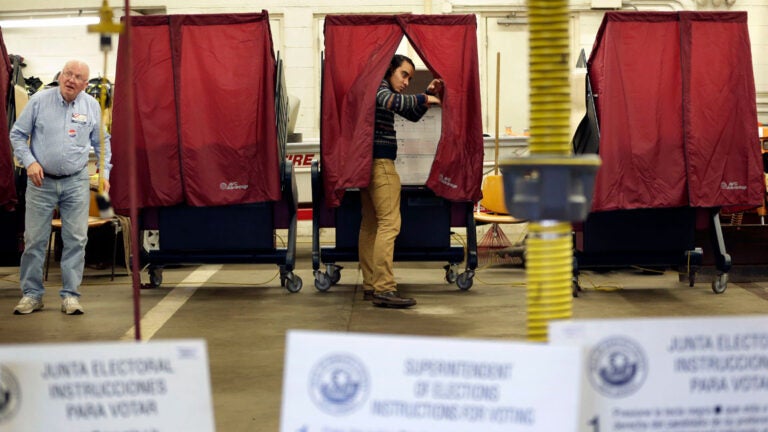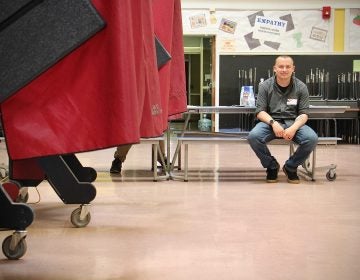Replacing N.J.’s old voting machines will come with big price tag. How big? Who knows
Other states have encountered spiraling costs and complications.

A voter exits their voting booth. (AP Photo/Seth Wenig)
This story originally appeared on NJ Spotlight.
___
Editor’s note: This coverage is made possible through Votebeat, a nonpartisan reporting project covering local election integrity and voting access. The article is available for reprint under the terms of Votebeat’s republishing policy.
New Jersey officials estimate that replacing the state’s aged fleet of voting machines could cost between $60 million and $80 million.
Add to that the price tag for new technology that would enable early in-person voting — a 2021 priority for state policymakers — and taxpayers could be looking at a $100 million bill in the next few years just to finance their own votes.
That comes to about $22 for every one of the 4.5 million Jerseyans who cast ballots in this year’s general election.
But other states that recently took on overhauls of their old voting equipment found that keeping the expense of democracy under control proved tricky, as the cost of employee training, along with maintenance and troubleshooting for the new technology soared. Hidden costs such as licensing fees also hit taxpayers hard.
Citizen groups in Georgia, for example, said the actual cost of new voting machines installed last year grew to $82 million more than the $104 million budgeted for the statewide project.
In New York, the cost of installing electronic poll books in early voting centers spiraled past initial estimates to a total of more than $175 million, according to a state elections board report that was leaked to the media. Louisiana taxpayers were also hit with a wave of unexpected costs when the price for their new voting system pushed past $100 million.
Market dominated by a few companies
Academic experts who chart the use of technology in American elections say the high cost of machines is, at bottom, a simple function of supply and demand. They point out that the voting machine market in the U.S. is dominated by a tiny handful of firms that operate in a closed market.
Those firms — Dominion Voting Systems, Hart InterCivic and the Omaha-based ES&S — control more than 90% of the market and are usually the only companies bidding on major voting machine contracts. In New Jersey, the trio are the only firms authorized by the state to sell voting machines, with most of the state’s 21 counties using machines made by ES&S, according to state data.
“There’s just no competition,” said David A. Bader of the New Jersey Institute of Technology, a computer scientist who consults on voting security issues. “The sole customer is the government.”
The result, Bader said, is that voting machines end up being a highly specialized type of black box that requires expensive experts to maintain: Instead of being able to shop around for service, states and counties are usually stuck with the sole option of going back to the dealer.
“Everything ends up being done by the voting machine company,” Bader said. “Training poll workers is done by the company. Firmware updates are done by the company. It can get expensive.”
NJ counties on the hook?
Most New Jersey counties use machines that are at least 10 years old, with some even using equipment installed before 2005. Unlike some states that pay for elections out of the state budget, New Jersey makes counties pay for most elections.
Frontline officials on local election boards say the huge expense of new voting equipment has scared them away from new machines, although three counties have recently used bond financing or federal grants to help them update old systems.
Many county officials also say paying for electronic poll books is also impossible. “Absolutely no money for that,” said Hunterdon County Clerk Mary Melfi.
Who’ll pay for electronic poll books?
The electronic poll books, about the size of a laptop computer, would be installed in hundreds of new early voting centers across the state as early as next spring under legislation now moving through Trenton. Gov. Phil Murphy and the Democratic leaders who control the Legislature support the early voting law, although they have not specified a final cost or where the money would come from.
Voting machine experts say there is only one thing worse than buying an expensive machine, and that is buying a bad machine. Even deep in the era of election hacking, they say, unsafe voting machines remain one of the biggest threats to American democracy.
Greg Miller, a Silicon Valley engineer and lawyer who founded the nonprofit Open Source Election Technology institute in 2006, warned that New Jersey is headed into treacherous territory full of hack-prone, expensive voting kit.
“The worst thing that can happen is that New Jersey replaces voting machines with equipment that doesn’t protect voters, and spends a fortune doing it,” Miller said. “Look at Georgia, they were hoodwinked.”
What happened in Georgia
Georgia’s new $100-million-plus touch-screen voting machines, from the Canadian firm Dominion Voting Systems, started to fail as soon as they were rolled out for the June 9 primary election. Electronic poll books crashed, wiping out votes and forcing many people to return to the polls to cast new ballots. Many people stood in line for hours waiting to vote.
By October, the system was still full of glitches. Test runs showed that touch-screen displays failed to show the names of all candidates in several races. Only days before the Nov. 3 election, technicians from Dominion, armed with thumb drives, rushed to install new software in all the state’s 34,000 voting machines.
Security experts and voting rights groups worried that the last-minute jiggering left the machines open to hacking and new glitches in future elections.
Miller said New Jersey could avoid similar problems by using voting machines that allow voters to mark all ballots on paper. Those machines, he said, also can come with the advantage of being a lot cheaper. Essex County is currently the only place in New Jersey with these so-called “voter verified paper ballot” machines.
“Voting security is a flat-out moral imperative,” Miller said. “But the voting technology we use today has shown time and time again that it is systematically vulnerable. And it’s all been furthered by a closed oligopoly of vendors.”
Vendors have upper hand
Miller and other experts say the three major voting machine companies have the upper hand in dealing with local election officials, who simply do not have the technical knowledge to shop smartly for voting gear. So they end up signing exorbitant contracts to buy and maintain black boxes that are too often error-prone and open to potential hacking.
In recent years, Miller’s group of some 70 engineering geeks and computing specialists has worked with groups like the National Security Agency to advise on voting security. Along with other innovators, they are seeking to create a new digital bible of open-source computer code that would be virtually hack-free and clear the way for a new generation of cheaper, safer voting hardware.
“In three or four years, this whole world will be recreated,” Miller said.
Until then, officials in New Jersey say they will keep doing their best with what they have. Election officers in several counties say that, despite all the new concerns about election hacking and potential fraud, they’ve done alright with the old machines and plan to stick with them.
They point out that a recent statewide audit of ballots in this year’s mostly mail-in elections showed that, in 2020 at least, the system worked. The audit was the first of its kind in decades, made possible by the mail-in paper ballots. In past years, the old touch-screen machines used by most counties did not allow for such a precise check on the votes.
“We can thank the paper ballot,” said Jamie Sheehan, a member of the Bergen County election board.
WHYY is your source for fact-based, in-depth journalism and information. As a nonprofit organization, we rely on financial support from readers like you. Please give today.





